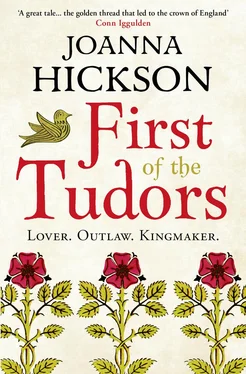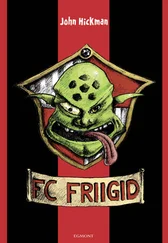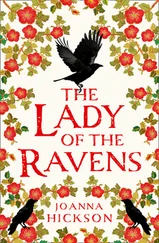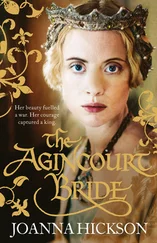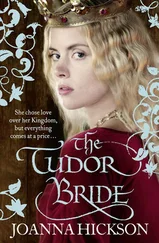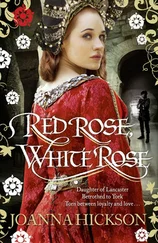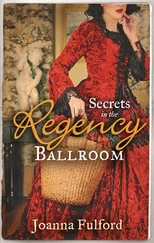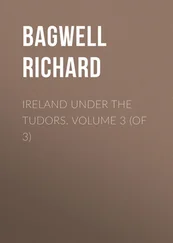He patted the bench beside him. ‘Please sit with me a while, Jane. Our fathers talk too much of times gone by. I would like to learn about your life here and now. I think Bethan cannot be much help in the house. She seems a little – simple, or am I being unkind?’
I bit my lip. We did not like to discuss Bethan’s condition with strangers but although he had no Welsh and clearly knew nothing of our ways, I discerned a warm heart in Jasper, which gave me confidence in his discretion. After all, however many times removed, we were cousins – family.
I sat down, careful to leave a respectable distance between us. In the moonlight he looked younger, more like one of my brothers than an esquire of the king’s household, which I now knew him to be. ‘No, you are not unkind, sir; you are perceptive. Bethan is simple but she loves my father and shares his bed willingly. It is not her fault that she has no great domestic skills. She cannot cook or make bread or cheese, although she can churn butter if you stop her at the right moment. She cannot recognize one herb from another or remember their properties and she cannot tell a mark from a groat. But when she is not great with child she can weed the vegetable garden, milk the cows and goats, feed the poultry and collect the eggs; she loves to tend the orphaned lambs and calves and if I set it up for her she can turn a spindle for hours.’ I gave him a cheerful smile. ‘So you see she is far from helpless, and there is also Mair who is our dairymaid, who lives in the village by the shore and fetches and carries and makes the pottage.’
The sound of the stream that ran fast-flowing through the wooded vale beside the house filled the silence between us agreeably. The vale and the stone-walled fields surrounding the policies were all bathed in milky moonlight. ‘Our grandfather chose well when he built here,’ I told him. ‘The stream gives us milling-power and clean water, we have wool for weaving, grain to make bread and ale, and fat for lamps and soap. The sheep give us fleeces to sell to the monks, we have fish in the sea, meat on the hoof and crops in the fields. Between us we make most things we need and I keep the accounts and the recipes. Our household works quite well. You will see if you stay a while.’
‘I suspect that it works because you toil from dawn to dusk, Jane. And where and when did you get an education, which you clearly have?’
‘That was due to my mother. She spent her girlhood in a convent and taught us all to read and write and reckon. I am trying to ensure that Evan learns now but it is not easy, especially at this time of year when he is needed on the land. In winter it is easier to keep him at his letters. Our mother intended him for the priesthood but I cannot imagine that happening now. He is bright but not at all bookish.’ I knew I was talking too much but the words just seemed to spill out of me.
Jasper screwed up his face and shook his head in exasperation. ‘I feel I should remember your mother. Her name was Agnes was it not? But tragically I cannot even picture my own. Edmund says he can but if so he does not describe her very well. He makes her sound like a royal doll, which I am sure she was not.’
I felt a stab of pity for him. My memories of my mother were so vivid that sometimes when I was quietly sewing I felt she was sitting at my shoulder. ‘My mother always spoke of yours as an angel. There is no doubt that she was beautiful, whereas mine was like me – I think homely is the word.’
Jasper gave a derisive snort. ‘In my vocabulary homely is a polite word for ugly – and that you are not, Jane! I would say that comely is the proper word – or pretty – certainly attractive! With sweeping eyelashes like yours how could you be anything else?’
I dropped my head, hoping the white glare of moonlight would disguise the sudden colour that rushed to my cheeks. Compliments did not flow freely in our family and my reaction to Jasper’s was involuntary and regrettably rather gauche. ‘Not beautiful anyway,’ I muttered, clenching my hands together in my lap.
He made another dismissive noise. ‘Huh! I do not think beauty always begets beauty, Jane. Look at Edmund and me for instance. He has our father’s bronze good looks, whereas I am blessed with ginger hair and ruddy cheeks. My mother called me Jasper after the dark-red bloodstone in her ring and I imagine she thought the name, like the gemstone, would bring me luck. A younger son always needs luck, does he not?’
With his fresh, freckled complexion and brilliant blue eyes, which even the moon’s glare could not bleach, I wanted to say that he appeared more than comely to me but shyness prevented it. Instead I said, ‘You remember that much about her anyway.’
‘No, I do not remember that; Mette told me.’
‘Who is Mette?’
‘A very bright and forthright lady who knew both our mothers well. She is an old lady now but in some ways you remind me of her.’
Regrettably I have a mercurial temperament and abruptly my mood changed from shyness to indignation. ‘I remind you of a blunt old lady? Well, thank you indeed, sir!’ I stood up and made him a sudden curtsy. ‘Please excuse me, it is time I chased Evan to bed.’
I knew I was being rude to a guest but I could not help myself and left him frowning. Moments later I heard footsteps behind me; his voice in my ear sounded contrite. ‘I said bright, not blunt, Jane! And Mette is probably the woman I admire most in the world.’
It was not until later, curled up sleepless on my pallet by the hearth, that I appreciated the compliment hidden in Jasper’s words.

The Royal Progress; Westminster & Greenwich
SWEET JANE’S BONNY FEATURES were to become a recurring image in my mind throughout the year that followed, particularly those long, sweeping eyelashes shading her deep brown-velvet eyes. Certain memories made particularly vivid returns. In blessedly balmy weather we had shared the rustic delights of shepherding Hywel’s flock of sheep up to the high pastures and the picture of Jane, in a straw hat and long boots, with her skirts tucked up and a shepherd’s crook in her hand, made frequent visitations in my quieter moments. Later, on our return to Tŷ Cerrig, I had witnessed her handling the birth of Bethan’s baby, when she chased all the men out of the house and set about supervising the midwife, cheering the mother and reassuring the grandmother, all with seemingly unruffled efficiency. And meanwhile I managed to pick up a few words of Welsh, at least enough to identify a mab from a merch , which is to say a boy from a girl. I had little experience of females of any age but the sight of this smiling fourteen-year-old merch emerging from the front door of the farmhouse to present her father with his newborn daughter remained with me for months, inspiring comparison with church images of the Madonna and Child.
Walking our horses to the field one day Edmund had been scornful of my friendship with Jane, pointing out to me that a relationship with a Welsh farm-girl, especially one whose grandfather had been outlawed for rebelling against the crown, would not be one to mention at court. ‘Enjoy her company while we are here, Jas, bed her if you will, not that beds seem to abound in this part of the world, but for pity’s sake keep silent on the subject of Jane when we return to Westminster.’
I worried about Edmund’s attitude towards females. He did not seem to have absorbed any of the rules of chivalry drummed into us during the lessons on Arthurian legend, which the king had insisted should be part of our preparation for knighthood and which laid particular stress on respect for women. Edmund was always careful to impress our tutors with his grasp of Latin verse and philosophical texts but his moral code was that of the alehouse.
Читать дальше
